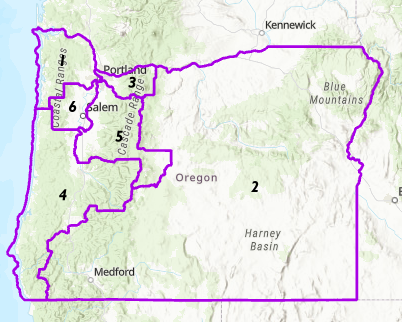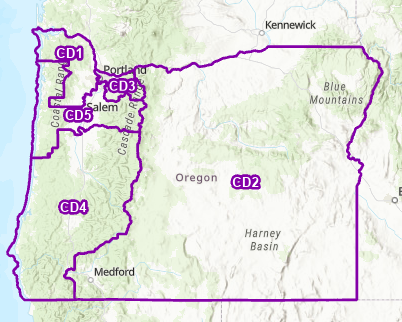Republicans accuse Oregon Democrats of gerrymandering; call for independent redistricting commission

The new Oregon The congressional district map set to take effect in the 2022 midterms.
With the redistricting process completed in Oregon in September, Republicans in the state claim that the maps have been unfairly drawn by Democrats.
Republicans have filed suit in the state seeking to have the maps redone, with some claiming that the only long-term solution is to take away the state legislature’s redistricting power entirely and leave it to an independent commission.
The new map divides Oregon into six congressional districts, with four districts being safely Democratic, one securely Republican and the last district a tossup, according to FiveThirtyEight.
While Republicans allege gerrymandering, Democratic Senator Michael Dembrow, who represents Northeast Portland including the McDaniel area, is not convinced. He expressed his belief that while gerrymandering certainly happens, the term was overused by people and in the case of Oregon was not a problem.

“The term gerrymandering is thrown around very loosely, and I just don’t see that here,” Dembrow stated.
He elaborated, conceding that while initial proposals drawn by both Democrats and Republicans were skewed, the committee came together to make maps which were a fair and balanced compromise before they were enacted into law. The committee was composed of three Democrats and two Republicans.
Republican Representative Suzanne Weber of the Tillamook area disagrees with Dembrow’s assertion that the maps were balanced.
“I think the map is seriously gerrymandered,” said Weber. “There’s nothing about those lines that I see as fair.”
Weber pointed to Portland on the map, which will be divided throughout four of the six districts within the state. In the state legislature, she cited Tillamook county, which will be split among three districts.
Democratic Representative Andrea Salinas, who co-chaired the redistricting committee in the House, spoke to some of Weber’s views in an interview with Oregon Public Broadcasting (OPB). She pointed out that during the process they had held 22 public hearings and received over 2,000 pieces of written testimony. She also pointed out that Oregon had allowed citizens to submit their own maps to the committee for consideration, the only state to do so.
While the debate over whether or not the state legislature can be trusted to fairly draw district maps is happening, support for a ballot measure that would give that power instead to an independent commission is growing. Such a measure has failed to amass the signatures needed to make it on the ballot before, but organizers are confident that they will be able to acquire the nearly needed 150,000 signatures, according to the PeopleNotPoliticians website, the group that is organizing the signature collection. The deadline to collect those signatures is July 8, 2022.
As far as the composition of the commission goes, there are several proposals. The main one is a panel of judges appointed by the governor and approved by the state legislature. Other possibilities include an elected board exclusively for the process or the Oregon Supreme Court.
The initiative has been endorsed by various groups such as the National Association for the Advancement of Colored People (NAACP), The Oregonian and The League of Women Voters. Various parties such as the Republicans and Progressives have also rallied behind the cause.
House Republican Leader Christine Drazan said that independent committees are the only path to fair district maps and called on Oregonians to vote yes if the measure ever makes it on the ballot.
“Oregonians will only get the fair maps they deserve, free of partisan influence, by supporting an independent redistricting commission in the next election,” said Drazan.
Democratic politicians’ opinions on the matter are scattered. Some outright oppose the idea, while others fully support it. Dembrow is not entirely against the concept, but he believes that the state legislature drawing the maps comes with some advantages.
“The one benefit of having the legislatures making the decisions is they do have accountability to the public, they’re elected. Whereas the commissions are not,” said Dembrow.
In the short term, Republicans are seeking to alleviate their concerns of gerrymandering through the courts. A lawsuit has been filed in the Marion County Circuit Court by Bev Clarno, a former Oregon Secretary of State, along with three other Republican plaintiffs. The lawsuit is slated to go before a panel of five judges who will decide whether or not the new district map is fairly drawn.
The deadline for the court’s ruling is Nov. 24, but a decision could come sooner than that. If the judges side with Republicans, they will decide how the lines should be redrawn in their ruling.
Ian is a Senior, and they are passionate about writing, history and the outdoors. People describe them as witty, observant and intelligent. They love being a journalist because they love informing people about what is going on in the world.










